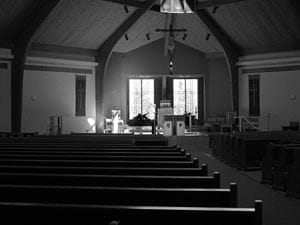
There has been an exodus of young people from most churches in America. Look around the average church and you will see that the pews are filled largely with elderly and middle aged people. The handful of younger people who attend regularly are usually either bored looking teenagers with their parents or recently married couples. There are few to no young, single people in the congregation. In most churches, young people only attend regularly if they have crossed milestones such as marriage or having children. This is not a healthy makeup for a church. Middle aged people and older people may carry the church financially as they are making more money than young people who are either still in school or working in their first career job. Without young people, however, the future of the church is dark. Without young people to pick up the torch as the previous generation ages, churches are doomed to slip quietly into obscurity and then oblivion. There have been a large number of church closings in recent years, and it is likely that those tiny congregations that were still attending were by and large middle aged or older.
Obviously, attracting young people to a church and convincing them to stay is of paramount importance. As Christianity faces increasing social attacks and declining membership numbers, it is essential that young people stay in church. They, after all, are the future of the religion. Keeping young people around, however, is difficult when you do not know why they are leaving in the first place. Every individual has their reasons, but here are some common reasons that young people leave church behind.
They don’t feel welcome.
Young people take a lot of flack for insisting on safe-spaces and protections for their self-esteem. A large amount of that criticism is deserved. There is a difference, however, between having a thin skin and being made to perpetually feel like an outsider or someone who is unwanted. Churches, unfortunately, sometimes give off this air. Occasionally, the actions that push young people away are subtle. There may be an unspoken tradition that only people who are above a certain age can help with the ministry. Church events might always focus on the concerns of those who are older, and the expectation is that young people are to simply go along with it. The issues might also be more obvious. If your church has a pastor who likes to talk about how millennials are ruining the country or that all young people are doing drugs, having sex and living terrible lives, why would you be surprised if there is an exodus of everyone under the age of 30? Hard truths need to be spoken, and churches should not shy away from them. There is, however, a difference between pointing out a problem and lambasting an entire generation.The church has wishy washy theology.
Some churches are bending over backwards and doing Olympic-level mental gymnastics in order to shape theology to what they think young people want to hear. Churches either tie themselves in knots to take an extremely progressive stance on hot-button issues such as gay marriage and abortion, or they treat such topics like the proverbial third rail. Ironically, surveys have shown that this is exactly the opposite of what most young people want. Young people like consistency when it comes to theology. If your church is against something, hold fast to that. If your church is in favor of something, do not shy away from that. Some young people will leave or refuse to join based on a church’s position on social issues, but those who do stay or join will not be going anywhere. If you oscillate between two positions on a topic, young people will see the church as flaky and unreliable. So, they will go somewhere else. Besides, the sad thing is that trying to find middle ground today is likely to simply tick off both sides of the debate.The pastor is preaching politics.
If your pastor is more interested in preaching politics than Psalms, do not be surprised to see the congregation shrinking. Social issues and political opinions have become more divisive than ever, and both the national media and social media are fanning those flames. As such, there is no way to win when a pastor gets up behind the pulpit and starts talking about politics. Almost no matter what the pastor says, half the congregation is going to be angry, especially if the “sermon” focuses on complex or hot-button issues such as immigration.The entire congregation is likely to be unhappy to have time meant to be dedicated to worshipping God spent instead listening to their pastor espouse his political opinion. Given the anti-authority streak present in so many young people, this is likely to annoy them even more than others. Unfortunately, even a single politically charged sermon can be enough to drive young people away. Many young people see political issues not in terms of successful and unsuccessful policies but in terms of, disturbingly, good and evil. If they think that the pastor is preaching something evil, they are going to walk right out the door and not come back.
Young people are essential for a healthy congregation and stable church future, but far too many of them are abandoning church. Some of it might simply be that they have grown up in a world that does not value religion and attended colleges that discourage expressions of faith. Those problems are difficult to fix, but before you despair, take a second look at your own church’s practices. The real reason young people are leaving might be far closer to home.

